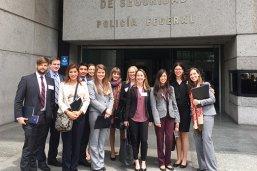Applying new knowledge to complex client issues.
Master of Public Affairs and Master of Global Policy Studies students cap off their academic experience at LBJ with a year-long policy research project (PRP). This project pairs teams of students with a client to address a complex policy issue in a real-world context.
Each fall, students attend a PRP fair to explore the coming academic year’s projects. Reports are issued to clients at the end of the spring semester.
Policy Research Projects
Housing + Economic & Social Mobility
For clients HousingWorks and the Housing Authority of the City of Austin, students will examine the connection between housing and mobility and the access to predictors of economic and social mobility such as education, health care, open space and social opportunities. Faculty lead: Sherri Greenberg
Sustainability of Engineered Rivers in Arid Lands: The Paso del Norte
Students will study options for sustainable water management in the Rio Grande/Bravo segment between Elephant Butte Reservoir and Fort Quitman, a watershed shared by two U.S. states and a Mexican state. Findings and policy recommendations on dealing with increased water scarcity will by published by Cambridge University Press in their UNESCO Hydrology Series. Faculty leads: Jurgen Schmandt and Chandler Stolp
Evaluating the Impact of PreK3
For client Austin Independent School District, students will conduct the first evaluation in the nation to determine whether children who experience two years of public preK (ages 3-4) are better prepared for Kindergarten. Faculty lead: Cynthia Osborne
Texas Low-Income Profiles Project
Students will contribute to a better understanding of low- to middle-income Texans with a goal of enabling strategic decision-making among stakeholders in Texas’ electricity market—utilities, regulators, policymakers, nonprofits and service providers. Client: Texas Energy Poverty Research Institute. Faculty lead: Heath Prince.
Young Hip Austin is Getting Old: A New Experiment in Dealing with the Challenge
Students will develop a business plan to address care needs in a diverse Austin neighborhood with a rapidly aging low-income population. Clients: Central Health and St. David’s Foundation. Faculty lead: Jacqueline Angel
Beyond the Border: Policy Responses for Central American Migration
For client Sin Fronteras, students will conduct research into better responses to issues related to Central American migration, covering security concerns, overlap of migrant smuggling groups with organized criminal networks, current Mexican policy efforts and U.S. border and immigration policies. Faculty lead: Stephanie Leutert
Commercialization of Advanced Technologies in Poor Rural Areas in Japan and Nepal
This class will provide study and action opportunities for students in the challenge of commercialization of high-tech industries in poor rural areas that seek to create new businesses, employment and wealth. Faculty lead: David Eaton
Interplay of Social, Economic, Technological and Policy Drives in the Solar Industry
Students will study the underlying social, economic, technological and policy processes that have shaped the solar industry. Client: Lawrence Berkeley National Laboratory. Other partners: National Renewable Energy Laboratory, University of Wisconsin-Madison and Yale University. Faculty lead: Varun Rai
Spies and Special Operations: Unity of Effort in the ‘Gray Zone’ Between War and Peace
With a final report to the Department of Defense, students will examine the progressive integration of capabilities of U.S. Special Operations forces and the U.S. intelligence community since 9/11. Faculty lead: Paul Pope
Plutonium for Energy? Environmental, Economic and Security Issues
Students will produce cross-national case studies of past efforts to recycle plutonium as fuel in nuclear power reactors, focusing on economic, environmental and security concerns. Faculty lead: Alan Kuperman
Pathways to Energizing the Texas Permian Basin
Students recommend concrete steps to continue to grow the Permian Basin as a hub and connector for the region's engagement, enrichment, and innovation.
Faculty lead: Steven Pedigo
Stephen F. Austin University: An Anchor Institution in Deep East Texas
Stephen F. Austin partnered with the LBJ School of Public Affairs to build a plan that incorporates the strengths of the Deep East Texas region and the potential for SFA to move the economy toward resilience. Faculty lead: Steven Pedigo
Students examine U.S. response to foreign election interference

A Policy Research Project (PRP) led by Professor Stephen B. Slick is assessing efforts by Russia and other foreign states to influence and damage the integrity of U.S. elections, and examining federal response to safeguard future elections. Its recommendations will go to the Office of the Director of National Intelligence.
LBJ explores how cities used UN conference to fight climate change through food policy

A Policy Research Project (PRP) led by Research Professor Raj Patel investigates how some cities' innovation and commitment are leading the way on food systems and climate change — and putting pressure on national governments.
LBJ students tackle Mexico Security challenges

Students take a comprehensive look at Mexican security policy to think critically about ways they could be improved in the future. From readings to guest lecturers and a trip to Mexico City, students immersed themselves in numerous aspects of this complicated international issue.
Supporting collaboration to address local poverty

A 2016-17 Policy Research Project led by the LBJ School’s Chris King focused on 2-Gen strategies in Central Texas to streamline and coordinate the services provided to families to help them improve their economic situation.
Learn more about our master's programs.

